2019高考全国卷英语
2019年全国卷1(英语)含答案
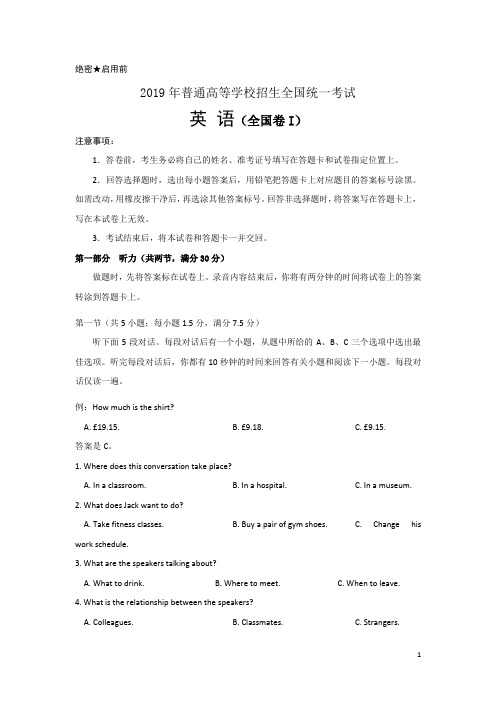
绝密★启用前2019年普通高等学校招生全国统一考试英语(全国卷I)注意事项:1.答卷前,考生务必将自己的姓名、准考证号填写在答题卡和试卷指定位置上。
2.回答选择题时,选出每小题答案后,用铅笔把答题卡上对应题目的答案标号涂黑。
如需改动,用橡皮擦干净后,再选涂其他答案标号。
回答非选择题时,将答案写在答题卡上,写在本试卷上无效。
3.考试结束后,将本试卷和答题卡一并交回。
第一部分听力(共两节,满分30分)做题时,先将答案标在试卷上。
录音内容结束后,你将有两分钟的时间将试卷上的答案转涂到答题卡上。
第一节(共5小题;每小题1.5分,满分7.5分)听下面5段对话。
每段对话后有一个小题,从题中所给的A、B、C三个选项中选出最佳选项。
听完每段对话后,你都有10秒钟的时间来回答有关小题和阅读下一小题。
每段对话仅读一遍。
例:How much is the shirt?A. £19.15.B. £9.18.C. £9.15.答案是C。
1. Where does this conversation take place?A. In a classroom.B. In a hospital.C. In a museum.2. What does Jack want to do?A. Take fitness classes.B. Buy a pair of gym shoes.C. Change his work schedule.3. What are the speakers talking about?A. What to drink.B. Where to meet.C. When to leave.4. What is the relationship between the speakers?A. Colleagues.B. Classmates.C. Strangers.5. Why is Emily mentioned in the conversation?A. She might want a ticket.B. She is looking for the man.C. She has an extra ticket.第二节(共15小题;每小题1.5分,满分22.5分)听下面5段对话或独白。
2019年全国统一高考英语试卷(新课标Ⅰ)【高考真题 含详细答案和解释、可编辑】
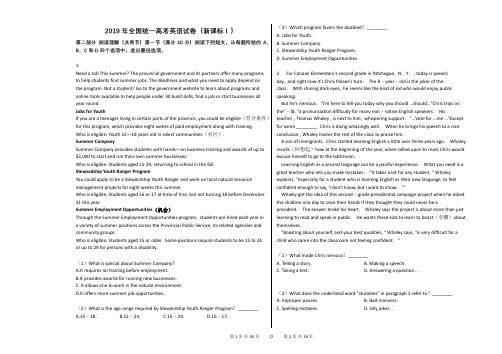
2019年全国统一高考英语试卷(新课标Ⅰ)第二部分阅读理解(共两节)第一节(满分30分)阅读下列短文,从每题所给的A、B、C和D四个选项中,选出最佳选项。
1.Need a Job This Summer? The provincial government and its partners offer many programsto help students find summer jobs. The deadlines and what you need to apply depend onthe program. Not a student? Go to the government website to learn about programs and online tools available to help people under 30 build skills, find a job or start businesses all year round.Jobs for YouthIf you are a teenager living in certain parts of the province, you could be eligible(符合条件)for this program, which provides eight weeks of paid employment along with training.Who is eligible: Youth 15—18 years old in select communities(社区).Summer CompanySummer Company provides students with hands—on business training and awards of up to $3,000 to start and run their own summer businesses.Who is eligible: Students aged 15-29, returning to school in the fall.Stewardship Youth Ranger ProgramYou could apply to be a Stewardship Youth Ranger and work on local natural resource management projects for eight weeks this summer.Who is eligible: Students aged 16 or 17 at time of hire, but not turning 18 before December 31 this year.Summer Employment Opportunities(机会)Through the Summer Employment Opportunities program, students are hired each year ina variety of summer positions across the Provincial Public Service, its related agencies and community groups.Who is eligible: Students aged 15 or older. Some positions require students to be 15 to 24or up to 29 for persons with a disability.(1)What is special about Summer Company?A.It requires no training before employment.B.It provides awards for running new businesses.C. It allows one to work in the natural environment.D.It offers more summer job opportunities.(2)What is the age range required by Stewardship Youth Ranger Program?________A.15﹣18.B.15﹣24.C.15﹣29.D.16﹣17.(3)Which program favors the disabled?________A. Jobs for Youth.B. Summer Company.C. Stewardship Youth Ranger Program.D. Summer Employment Opportunities.2. For Canaan Elementary's second grade in Patchogue, N.Y., today is speechday , and right now it's Chris Palaez's turn. The 8﹣year﹣old is the joker of the class. With shining dark eyes, he seems like the kind of kid who would enjoy public speaking.But he's nervous."I'm here to tell you today why you should …should…"Chris trips on the"﹣ld, "a pronunciation difficulty for many non﹣native English speakers. His teacher , Thomas Whaley , is next to him, whispering support."…Vote for …me …"Except for some ________, Chris is doing amazingly well. When he brings his speech to a nice conclusion , Whaley invites the rest of the class to praise him.A son of immigrants, Chris started learning English a little over three years ago. Whaley recalls(回想起)how at the beginning of the year, when called upon to read, Chris would excuse himself to go to the bathroom.Learning English as a second language can be a painful experience. What you need is a great teacher who lets you make mistakes. "It takes a lot for any student, " Whaley explains, "especially for a student who is learning English as their new language, to feel confident enough to say, 'I don't know, but I want to know.'"Whaley got the idea of this second﹣grade presidential campaign project when he asked the children one day to raise their hands if they thought they could never be a president. The answer broke his heart. Whaley says the project is about more than just learning to read and speak in public. He wants these kids to learn to boast(夸耀)about themselves."Boasting about yourself, and your best qualities, " Whaley says, "is very difficult for a child who came into the classroom not feeling confident."(1)What made Chris nervous?________A. Telling a story.B. Making a speech.C. Taking a test.D. Answering a question..(2)What does the underlined word "stumbles" in paragraph 2 refer to?________A. Improper pauses.B. Bad manners.C. Spelling mistakes.D. Silly jokes..(3)We can infer that the purpose of Whaley's project is to________.A. help students see their own strengthsB. assess students' public speaking skillsC. prepare students for their future jobsD. inspire students' love for politics.(4)Which of the following best describes Whaley as a teacher?________A. Humorous.B. Ambitious.C. Caring.D. Demanding.3.As data and identity theft becomes more and more common, the market is growing for biometric(生物测量)technologies—like fingerprint scans—to keep others out of private e-spaces. At present, these technologies are still expensive, though.Researchers from Georgia Tech say that they have come up with a low-cost device(装置)that gets around this problem: a smart keyboard. This smart keyboard precisely measures the cadence(节奏)with which one types and the pressure fingers apply to each key. The keyboard could offer a strong layer of security by analyzing things like the force of a user's typing and the time between key presses. These patterns are unique to each person. Thus, the keyboard can determine people's identities, and by extension, whether they should be given access to the computer it's connected to—regardless of whether someone gets the password right.It also doesn't require a new type of technology that people aren't already familiarwith. Everybody uses a keyboard and everybody types differently.In a study describing the technology, the researchers had 100 volunteers type the word "touch" four times using the smart keyboard. Data collected from the device could be used to recognize different participants based on how they typed, with very low error rates. The researchers say that the keyboard should be pretty straightforward to commercialize and is mostly made of inexpensive, plastic-like parts. The team hopes to make it to market in the near future.(1)Why do the researchers develop the smart keyboard?A.To reduce pressure on keys.B.To improve accuracy in typing.C.To replace the password system.D.To cut the cost of e-space protection.(2)What makes the invention of the smart keyboard possible?puters are much easier to operate.B.Fingerprint scanning techniques develop fast.C.Typing patterns vary from person to person.D.Data security measures are guaranteed.(3)What do the researchers expect of the smart keyboard?A.It'll be environment-friendly.B.It'll reach consumers soon.C.It'll be made of plastics.D.It'll help speed up typing.(4)Where is this text most likely from?A.A diary.B.A guidebook.C.A novel.D.A magazine.4. During the rosy years of elementary school(小学), I enjoyed sharing my dolls and jokes, which allowed me to keep my high social status. I was the queen of the playground. Then came my tweens and teens, and mean girls and cool kids. They rose in the ranks not by being friendly but by smoking cigarettes, breaking rules and playing jokes on others, among whom I soon found myself.Popularity is a well﹣explored subject in social psychology. Mitch Prinstein, a professor of clinical psychology sorts the popular into two categories: the likable and the status seekers. The likables' plays﹣well﹣with﹣others qualities strengthen schoolyard friendships, jump﹣start interpersonal skills and, when tapped early, are employed ever after in life and work. Then there's the kind of popularity that appears in adolescence: status born of power and even dishonorable behavior.Enviable as the cool kids may have seemed, Dr. Prinstein's studies show unpleasant consequences. Those who were highest in status in high school, as well as those least liked in elementary school, are "most likely to engage(从事)in dangerous and risky behavior."In one study, Dr. Prinstein examined the two types of popularity in 235 adolescents, scoring the least liked, the most liked and the highest in status based on student surveys(调查研究). "We found that the least well﹣liked teens had become more aggressive over time toward their classmates. But so had those who were high in status. It clearly showed that while likability can lead to healthy adjustment, high status has just the opposite effect on us."Dr. Prinstein has also found that the qualities that made the neighbors want you on a play date﹣sharing, kindness, openness ﹣ carry over to later years and make you better able to relate and connect with others.In analyzing his and other research, Dr. Prinstein came to another conclusion: Not only is likability related to positive life outcomes, but it is also responsible for those outcomes, too. "Being liked creates opportunities for learning and for new kinds of life experiences that help somebody gain an advantage, " he said.(1)What sort of girl was the author in her early years of elementary school?________A. Unkind.B. Lonely.C. Generous.D. Cool..(2)What is the second paragraph mainly about?________A. The classification of the popular.B. The characteristics of adolescents.C. The importance of interpersonal skills.D. The causes of dishonorable behavior..(3)What did Dr. Prinstein's study find about the most liked kids?________A. They appeared to be aggressive.B. They tended to be more adaptable.C. They enjoyed the highest status.D. They performed well academically..(4)What is the best title for the text?________A. Be Nice﹣You Won't Finish LastB. The Higher the Status, the BetterC. Be the Best﹣You Can Make ItD. More Self﹣Control, Less Aggressiveness.第二节(满分10分)根据短文内容,从短文后的选项中选出能填入空白处的最佳选项.选项中有两项为多余选项.5.Is Fresh Air Really Good for You?We all grew up hearing people tell us to "go out and get some fresh air." (1)_______ According to recent studies,the answer is a big YES,if the air quality in your camping area is good.(2)_______ If the air you're breathing is clean﹣which it would be if you're away from the smog of cities﹣then the air is filled with life﹣giving,energizing oxygen. If you exercise out of doors,your body will learn to breathe more deeply,allowing even more oxygen to get to your muscles(肌肉)and your brain.Recently,people have begun studying the connection between the natural world and healing(治愈).(3)_______ In these places patients can go to be near nature during their recovery. It turns out that just looking at green,growing things can reduce stress,lower blood pressure,and put people into a better mood(情绪).Greenery is good for us. Hospital patients Who see tree branches out their window are likely to recover at a faster rate than patients who see buildings or sky instead.(4)_______ It gives us a great feeling of peace.(5)_______While the sun's rays can age and harm our skin, they also give is beneficial Vitamin D. To make sure you get enough Vitamin D﹣but still protect your skin﹣ put on sunscreen right as you head outside. It takes sunscreen about fifteen minutes to start working, and that's plenty of time for your skin to absorb a day's worth of Vitamin D.A. Fresh air cleans our lungs.B. So what are you waiting for?C. Being in nature refreshes us.D. Another side benefit of getting fresh air is sunlight.E. But is fresh air really as good for you as your mother always said?F. Just as importantly, we tend to associate air with health care.G. All across the country, recovery centers have begun building Healing Gardens.第三部分语言知识运用(共两节)第一节(每小题1.5分,满分30分)阅读下面短文,从短文后各题所给的A、B、C和D四个选项中,选出可以填入空白处的最佳选项.6. Every year about 40, 000 people attempt to climb Kilimanjaro, the highest mountain in Africa. They(1)_______ with them lots of waste. The (2)_______ might damage the beauty of the place. The glaciers(冰川)are disappearing, changing the(3)_______of Kilimanjaro.Hearing these stories, I'm (4)_______ about the place ﹣ other destinations are described as "purer" natural experiences.However, I soon (5)_______ that much has changed since the days of disturbing reports of(6)_______ among tons of rubbish. I find a(7)_______ mountain, with toilets at camps and along the paths. The environmental challenges are(8)_______but the efforts made by the Tanzania National Park Authority seem to be (9)_______.The best of a Kilimanjaro (10)_______, in my opinion, isn't reaching thetop. Mountains are(11)_______as spiritual places by many cultures. This(12)_______is especially evident on Kilimanjaro as(13)_______go through five ecosystems (生态系统)in the space of a few kilometers. At the base is a rainforest. It ends abruptly at 3, 000 meters, (14)_______lands of low growing plants. Further up, the weather(15)_______ ﹣ low clouds envelope the mountainsides, which are covered with thick grass. I(16)_______twelve shades of green from where I stand. Above 4, 000 meters is the highland(17)_______: gravel(砾石), stones and rocks.(18)_______you climb into an arctic﹣like zone with(19)_______snow and the glaciers that may soon disappear.Does Kilimanjaro (20)_______ its reputation as a crowded mountain with lines of tourists ruining the atmosphere of peace? I found the opposite to be true.(1)A.keepB.mixC.connectD.bring(2)A.storiesB.buildingsC.crowdsD.reporters(3)A.positionB.ageC.face(4)A.silentB.skepticalC.seriousD.crazy(5)A.discoverB.argueC.decideD.advocate(6)A.equipmentB.grassC.campsD.stones(7)A.remoteB.quietC.allD.clean(8)A.newB.specialC.significantD.necessary(9)A.paying offB.spreading outC.blowing upD.fading away(10)A.atmosphereB.experienceC.experimentD.sight(11)A.studiedB.observedC.exploredD.regarded(12)A.viewB.qualityC.reasonD.purpose(13)A.scientistsB.climbersC.localsD.officials(14)A.holding on toB.going back toC.living up toD.giving way to(15)A.changesB.clearsC.improvesD.permits (16)A.matchB.imagineC.countD.add(17)A.villageB.desertC.roadke(18)A.ObviouslyB.EasilyC.ConsequentlyD.Finally(19)A.permanentB.littleC.freshD.artificial(20)A.enjoyB.deserveC.saveD.acquire第二节(每小题1.5分,满分15分)阅读下面材料,在空白处填入1个适当的单词或括号内单词的正确形式。
2019年高考英语全国1卷含答案
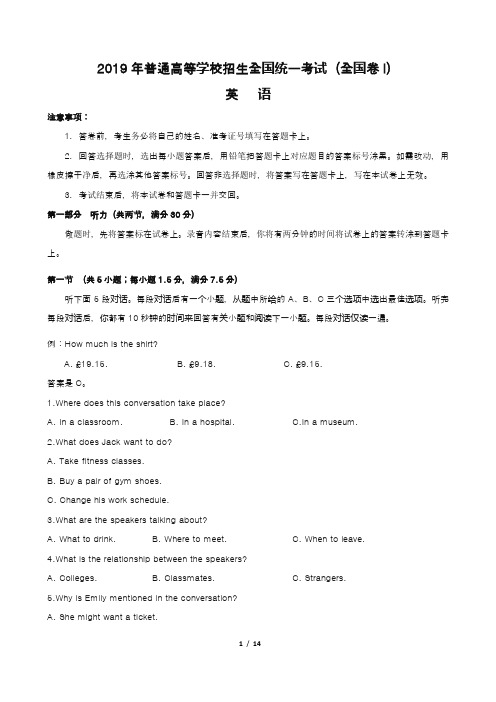
2019年普通高等学校招生全国统一考试(全国卷I)英语注意事项:1.答卷前,考生务必将自己的姓名、准考证号填写在答题卡上。
2.回答选择题时,选出每小题答案后,用铅笔把答题卡上对应题目的答案标号涂黑。
如需改动,用橡皮擦干净后,再选涂其他答案标号。
回答非选择题时,将答案写在答题卡上,写在本试卷上无效。
3.考试结束后,将本试卷和答题卡一并交回。
第一部分听力(共两节,满分30分)做题时,先将答案标在试卷上。
录音内容结束后,你将有两分钟的时间将试卷上的答案转涂到答题卡上。
第一节(共5小题;每小题1.5分,满分7.5分)听下面5段对话。
每段对话后有一个小题,从题中所给的A、B、C三个选项中选出最佳选项。
听完每段对话后,你都有10秒钟的时间来回答有关小题和阅读下一小题。
每段对话仅读一遍。
例:How much is the shirt?A. £19.15.B. £9.18.C. £9.15.答案是C。
1.Where does this conversation take place?A. In a classroom.B. In a hospital.C.In a museum.2.What does Jack want to do?A. Take fitness classes.B. Buy a pair of gym shoes.C. Change his work schedule.3.What are the speakers talking about?A. What to drink.B. Where to meet.C. When to leave.4.What is the relationship between the speakers?A. Colleges.B. Classmates.C. Strangers.5.Why is Emily mentioned in the conversation?A. She might want a ticket.B. She is looking for the man.C. She has an extra ticket.第二节(共15小题,每小题1.5分,满分22.5分)听下面5段对话或独白。
2019年全国高考英语试卷(新课标Ⅰ)(含解析版)
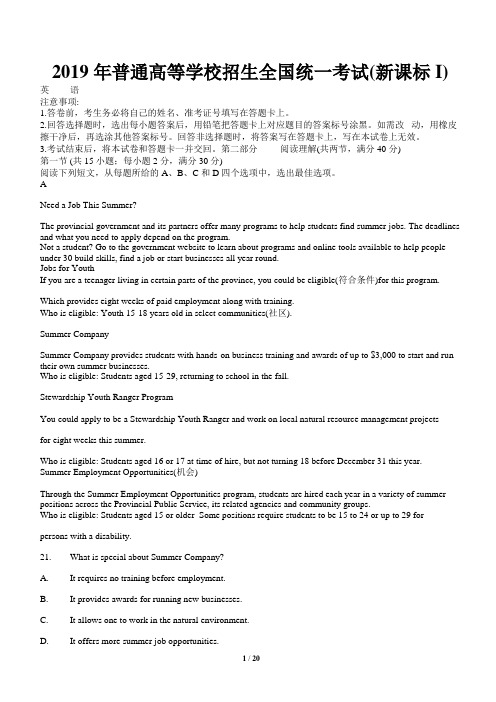
2019 年普通高等学校招生全国统一考试(新课标 I) 英语注意事项:1.答卷前,考生务必将自己的姓名、准考证号填写在答题卡上。
2.回答选择题时,选出每小题答案后,用铅笔把答题卡上对应题目的答案标号涂黑。
如需改动,用橡皮擦干净后,再选涂其他答案标号。
回答非选择题时,将答案写在答题卡上,写在本试卷上无效。
3.考试结束后,将本试卷和答题卡一并交回。
第二部分阅读理解(共两节,满分 40 分)第一节 (共 15 小题;每小题 2 分,满分 30 分)阅读下列短文,从每题所给的 A、B、C 和 D 四个选项中,选出最佳选项。
ANeed a Job This Summer?The provincial government and its partners offer many programs to help students find summer jobs. The deadlines and what you need to apply depend on the program.Not a student? Go to the government website to learn about programs and online tools available to help people under 30 build skills, find a job or start businesses all year round.Jobs for YouthIf you are a teenager living in certain parts of the province, you could be eligible(符合条件)for this program. Which provides eight weeks of paid employment along with training.Who is eligible: Youth 15-18 years old in select communities(社区).Summer CompanySummer Company provides students with hands-on business training and awards of up to $3,000 to start and run their own summer businesses.Who is eligible: Students aged 15-29, returning to school in the fall.Stewardship Youth Ranger ProgramYou could apply to be a Stewardship Youth Ranger and work on local natural resource management projectsfor eight weeks this summer.Who is eligible: Students aged 16 or 17 at time of hire, but not turning 18 before December 31 this year. Summer Employment Opportunities(机会)Through the Summer Employment Opportunities program, students are hired each year in a variety of summer positions across the Provincial Public Service, its related agencies and community groups.Who is eligible: Students aged 15 or older Some positions require students to be 15 to 24 or up to 29 for persons with a disability.21. What is special about Summer Company?A. It requires no training before employment.B. It provides awards for running new businesses.C. It allows one to work in the natural environment.D. It offers more summer job opportunities.22. What is the age range required by Stewardship Youth Ranger Program?A. 15-18.B. 15-24.C. 15-29.D. 16-17.23. Which program favors the disabled?A. Jobs for Youth.B. Summer Company.C. Stewardship Youth Ranger Program.D. Summer Employment Opportunities.BFor Canaan Elementary’s second grade in Patchogue, N.Y.,today is speech day ,and right now it’s Chris Palaez’s turn. The 8-year-old is the joker of the class. With shining dark eyes, he seems like the of kid who would enjoy public speaking.But he’s, nervous.“I’m here to tell you today why you should … should…”Chris trips on the“-ld,”a. pronunciation difficulty for many non-native English speakers. His teacher ,Thomas Whaley ,is next to him, whispering support.“…Vote for …me …”Except for some stumbles, Chris is doing amazingly well. When he brings his speech to a nice conclusion ,Whaley invites the rest of the class to praise him.A son of immigrants, Chris stared learning English a little over three years ago. Whaley recalls(回想起)how at the beginning of the year,when called upon to read,Chris would excuse himself to go to the bathroom.Learning English as a second language can be a painful experience. What you need is a great teacher who lets you make mistakes. “It takes a lot for any student,” Whaley explains,“especia lly for a student who is learning English as their new language,to feel confident enough to say,‘I don’t know,but I want to know.’”Whaley got the idea of this second-grade presidential campaign project when he asked the children one day to raise their hands if they thought they could never be a president. The answer broke his heart. Whaley says the project is about more than just learning to read and speak in public. He wants these kids to learn to boast(夸耀)about themselves.“Boasting about yourself,and your best qualities,” Whaley says,“is very difficult for a child who came into the classroom not feeling confident.”24. What made Chris nervous?A. Telling a story.B. Making a speech.C. Taking a test.D. Answering a question.25. What does the un derlined word “stumbles” in paragraph 2 refer to?A. Improper pauses.B. Bad manners.C. Spelling mistakes.D. Silly jokes.26. We can infer that the purpose of Whaley’s project is to .A. help students see their own strengthsB. assess students’ publ ic speaking skillsC. prepare students for their future jobsD. inspire students’ love for politics27. Which of the following best describes Whaley as a teacher?A. Humorous.B. Ambitious.C. Caring.D. Demanding.As data and identity theft becomes more and more common, the market is growing for biometric(生物测量)technologies—like fingerprint scans—to keep others out of private e-spaces. At present, these technologies are still expensive, though.Researchers from Georgia Tech say that they have come up with a low-cost device(装置)that gets around this problem: a smart keyboard. This smart keyboard precisely measures the cadence(节奏)with which one types and the pressure fingers apply to each key. The keyboard could offer a strong layer of security by analyzing things like the force of a user's typing and the time between key presses. These patterns are unique to each person. Thus, the keyboard can determine people's identities, and by extension, whether they should be given access to the computerit's connected to—regardless of whether someone gets the password right.It also doesn't require a new type of technology that people aren't already familiar with. Everybody uses a keyboard and everybody types differently.In a study describing the technology, the researchers had 100 volunteers type the word “touch”four timesusing the smart keyboard. Data collected from the device could be used to recognize different participants based on how they typed, with very low error rates. The researchers say that the keyboard should be pretty straightforward to commercialize and is mostly made of inexpensive, plastic-like parts. The team hopes to make it to market in the near future.28. Why do the researchers develop the smart keyboard?A. To reduce pressure on keys.B. To improve accuracy in typingC. To replace the password system.D. To cut the cost of e-space protection.29. What makes the invention of the smart keyboard possible?A. Computers are much easier to operate.B. Fingerprint scanning techniques develop fast.C. Typing patterns vary from person to person.D. Data security measures are guaranteed.30. What do the researchers expect of the smart keyboard?all 1o soisgitieoco oll.A. It'll be environment-friendly.B. It'll reach consumers soon.C. It'll be made of plastics.D. It'll help speed up typing.31. Where is this text most likely from?A. A diary.B. A guidebookC. A novel.D. A magazine.DDuring the rosy years of elementary school(小学), I enjoyed sharing my dolls and jokes, which allowed me to keep my high social status. I was the queen of the playground. Then came my tweens and teens, and mean girls and cool kids. They rose in the ranks not by being friendly but by smoking cigarettes, breaking rules and playing jokeson others, among whom I soon found myself.Popularity is a well-explored subject in social psychology. Mitch Prinstein, a professor of clinical psychology sorts the popular into two categories: the likable and the status seekers. The likables’ plays-well-with-others qualities strengthen schoolyard friendships, jump-start interpersonal skills and, when tapped early, are employed ever after in life and work. Then there’s the kind of popularity that appears in adolescence: status born of power andeven dishonorable behavior.Enviable as the cool kids may have seemed, Dr. Prinstein’s studies show unpleasant consequences. Those who were highest in status in high school, as well as those least liked in elementary school, are “most likely to engage(从事)in dangerous and risky behavior.”In one study, Dr. Prinstein examined the two types of popularity in 235 adolescents, scoring the least liked, the most liked and the highest in status based on student surveys(调查研究). “We found that the least well-liked teens had become more aggressive over time toward their classmates. But so had those who were high in status. It clearlyshowed that while likability can lead to healthy adjustment, high status has just the opposite effect on us." Dr. Prinstein has also found that the qualities that made the neighbors want you on a play date-sharing,kindness, openness — carry over to later years and make you better able to relate and connect with others.In analyzing his and other research,Dr. Prinstein came to another conclusion: Not only is likability related to positive life outcomes, but it is also responsible for those outcomes, too. "Being liked creates opportunities for learning and for new kinds of life experiences that help somebody gain an advantage, ” he said.32. What sort of girl was the author in her early years of elementary school?A. Unkind.B. Lonely.C. Generous.D. Cool.33. What is the second paragraph mainly about?A. The classification of the popular.B. The characteristics of adolescents.C The importance of interpersonal skills.D. The causes of dishonorable behavior.34. What did Dr. Prinstein’s study find about the most liked kids?A. They appeared to be aggressive.B. They tended to be more adaptable.C. They enjoyed the highest status.D. They performed well academically.35. What is the best title for the text?A. Be Nice-You Won’t Finish LastB. The Higher the Status, the BeerC. Be the Best-You Can Make ItD. More Self-Control, Less Aggressiveness第二节 (共 5 小题;每小题 2 分,满分 10 分)根据短文内容,从短文后的选项中选出能填入空白处的最佳选项。
(完整word)2019年全国高考英语卷1(附答案)
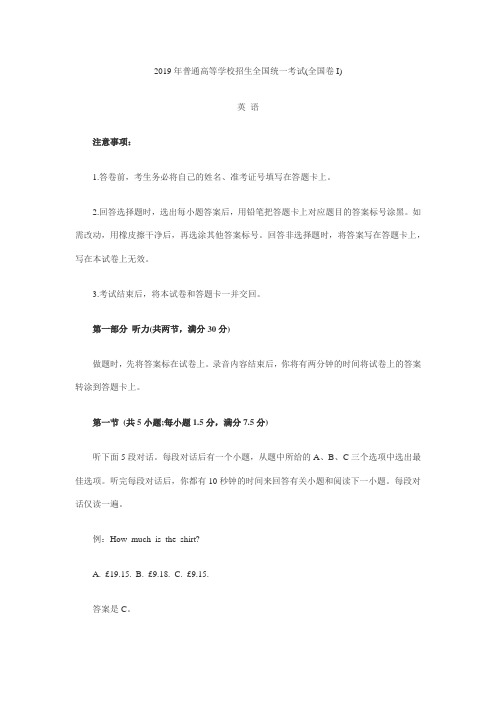
2019年普通高等学校招生全国统一考试(全国卷I)英语注意事项:1.答卷前,考生务必将自己的姓名、准考证号填写在答题卡上。
2.回答选择题时,选出每小题答案后,用铅笔把答题卡上对应题目的答案标号涂黑。
如需改动,用橡皮擦干净后,再选涂其他答案标号。
回答非选择题时,将答案写在答题卡上,写在本试卷上无效。
3.考试结束后,将本试卷和答题卡一并交回。
第一部分听力(共两节,满分30分)做题时,先将答案标在试卷上。
录音内容结束后,你将有两分钟的时间将试卷上的答案转涂到答题卡上。
第一节(共5小题;每小题1.5分,满分7.5分)听下面5段对话。
每段对话后有一个小题,从题中所给的A、B、C三个选项中选出最佳选项。
听完每段对话后,你都有10秒钟的时间来回答有关小题和阅读下一小题。
每段对话仅读一遍。
例:How much is the shirt?A. £19.15.B. £9.18.C. £9.15.答案是C。
1.Where does this conversation take place?A. In a classroom.B. In a hospital.C.In a museum.2.What does Jack want to do?A. Take fitness classes.B. Buy a pair of gym shoes.C. Change his work schedule.3.What are the speakers talking about?A. What to drink.B. Where to meet.C. When to leave.4.What is the relationship between the speakers?A. Colleges.B. Classmates.C. Strangers.5.Why is Emily mentioned in the conversation?A. She might want a ticket.B. She is looking for the man.C. She has an extra ticket.第二节(共15小题,每小题1.5分,满分22.5分)听下面5段对话或独白。
2019年全国I卷英语高考真题及参考答案.doc
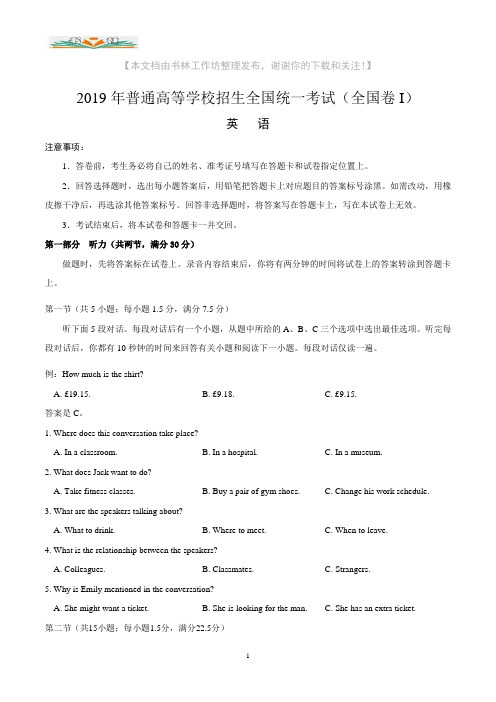
【本文档由书林工作坊整理发布,谢谢你的下载和关注!】2019年普通高等学校招生全国统一考试(全国卷I)英语注意事项:1.答卷前,考生务必将自己的姓名、准考证号填写在答题卡和试卷指定位置上。
2.回答选择题时,选出每小题答案后,用铅笔把答题卡上对应题目的答案标号涂黑。
如需改动,用橡皮擦干净后,再选涂其他答案标号。
回答非选择题时,将答案写在答题卡上,写在本试卷上无效。
3.考试结束后,将本试卷和答题卡一并交回。
第一部分听力(共两节,满分30分)做题时,先将答案标在试卷上。
录音内容结束后,你将有两分钟的时间将试卷上的答案转涂到答题卡上。
第一节(共5小题;每小题1.5分,满分7.5分)听下面5段对话。
每段对话后有一个小题,从题中所给的A、B、C三个选项中选出最佳选项。
听完每段对话后,你都有10秒钟的时间来回答有关小题和阅读下一小题。
每段对话仅读一遍。
例:How much is the shirt?A. £19.15.B. £9.18.C. £9.15.答案是C。
1. Where does this conversation take place?A. In a classroom.B. In a hospital.C. In a museum.2. What does Jack want to do?A. Take fitness classes.B. Buy a pair of gym shoes.C. Change his work schedule.3. What are the speakers talking about?A. What to drink.B. Where to meet.C. When to leave.4. What is the relationship between the speakers?A. Colleagues.B. Classmates.C. Strangers.5. Why is Emily mentioned in the conversation?A. She might want a ticket.B. She is looking for the man.C. She has an extra ticket.第二节(共15小题;每小题1.5分,满分22.5分)听下面5段对话或独白。
2019年全国统一高考英语试卷(新课标I)Word经典高清版本
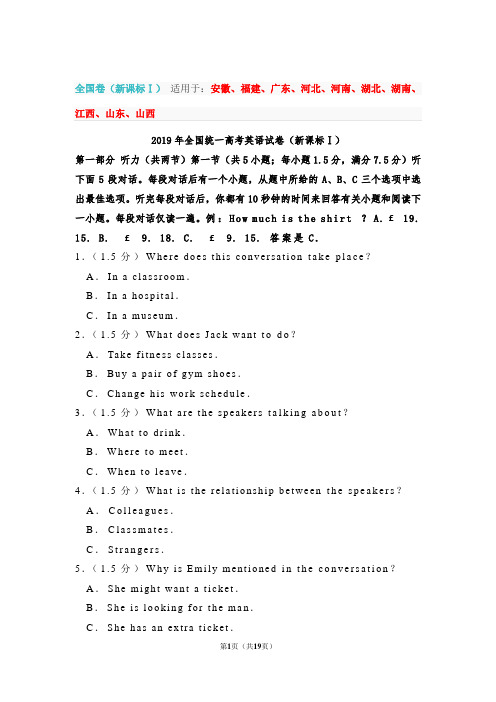
全国卷(新课标Ⅰ)适用于:安徽、福建、广东、河北、河南、湖北、湖南、江西、山东、山西2019年全国统一高考英语试卷(新课标Ⅰ)第一部分听力(共两节)第一节(共5小题;每小题1.5分,满分7.5分)听下面5段对话。
每段对话后有一个小题,从题中所给的A、B、C三个选项中选出最佳选项。
听完每段对话后,你都有10秒钟的时间来回答有关小题和阅读下一小题。
每段对话仅读一遍。
例:H o w m u c h i s t h e s h i r t?A. £19.15. B. £ 9. 18. C. £ 9. 15. 答案是C.1.(1.5分)W h e r e d o e s t h i s c o n v e r s a t i o n t a k e p l a c e?A.I n a c l a s s r o o m.B.I n a h o s p i t a l.C.I n a m u s e u m.2.(1.5分)W h a t d o e s J a c k w a n t t o d o?A.Ta k e f i t n e s s c l a s s e s.B.B u y a p a i r o f g ym s h o e s.C.C h a n g e h i s w o r k s c h e d u l e.3.(1.5分)W h a t a r e t h e s p e a k e r s t a l k i n g a b o u t?A.W h a t t o d r i n k.B.W h e r e t o m e e t.C.W h e n t o l e a v e.4.(1.5分)W h a t i s t h e r e l a t i o n s h i p b e t w e e n t h e s p e a k e r s?A.C o l l e a g u e s.B.C l a s s m a t e s.C.S t r a n g e r s.5.(1.5分)W h y i s E m i l y m e n t i o n e d i n t h e c o n v e r s a t i o n?A.S h e m i g h t w a n t a t i c k e t.B.S h e i s l o o k i n g f o r t h e m a n.C.S h e h a s a n e x t r a t i c k e t.第二节(每小题1.5分,满分22.5分)听下面5段对话或独白.每段对话或独白后有几个小题,从题中所给的A、B、C三个选项中选出最佳选项.听每段对话或独白前,你将有时间阅读各个小题,每小题5秒钟;听完后,各小题将给出5秒钟的作答时间.每段对话或独白读两遍.6.(3分)听材料,回答下列问题.(1)How long did James run his business?A.10 years.B.13 years.C.15 years.(2)How does the woman feel about James' situation?A.Embarrassed.B.Concerned.C.Disappointed.7.(4.5分)听材料,回答下列问题.(1)What has Kate's mother decided to do?A.Return to school.B.Change her job.C.Retire from work.(2)What did Kate's mother study at college?A.Oil painting.B.Art history.C.Business administration.(3)What is Kate's attitude toward her mother's decision?A.Disapproving.B.Ambiguous.C.Understanding.8.(4.5分)听材料,回答下列问题.(1)What is the man doing?A.Chairing a meeting.B.Hosting a radio program.C.Conducting a job interview.(2)What benefits Mary most in her job?A.Her wide reading.B.Her leaders' guidance.C.Her friends' help.(3)Who will Mary talk about next?A.Her teacher.B.Her father.C.Her mother.9.(6分)听材料,回答下列问题.(1)Why does the man seldom do exercise?A.He lacks motivation.B.He has a heart problem.C.He works all the time.(2)What does Jacob Sattelmair probably do?A.He's an athlete.B.He's a researcher.C.He's a journalist.(3)Why does the woman speak of a study?A.To encourage the man.B.To recommend an exercise.C.To support her findings.(4)How much time will the man probably spend exercising weekly?A.300 minutes.B.150 minutes.C.75 minutes.10.(4.5分)听材料,回答下列问题.(1)What did the scientists do to the road?A.They repaired it.B.They painted it.C.They blocked it.(2)Why are young birds drawn to the road surface?A.It's warm.B.It's brown.C.It's smooth.(3)What is the purpose of the scientists' experiment?A.To keep the birds there for a whole year.B.To help students study the birds wel l.C.To prevent the birds from being killed.第二部分阅读理解(共两节)第一节(满分30分)阅读下列短文,从每题所给的A、B、C和D四个选项中,选出最佳选项。
2019年全国统一高考英语试卷(新课标ⅲ)和答案
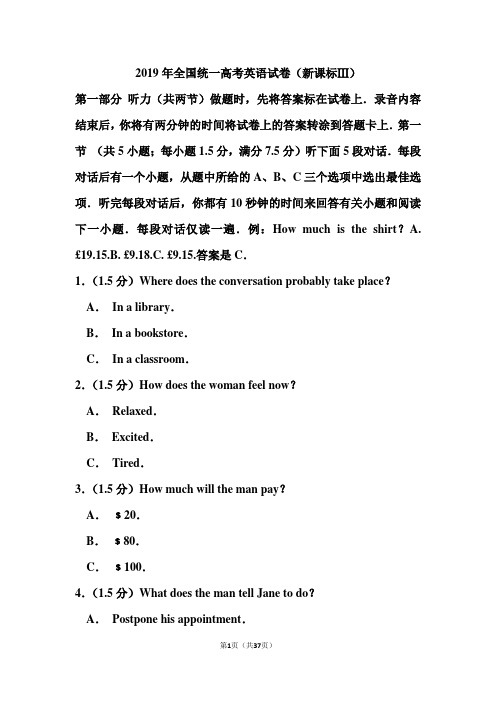
2019年全国统一高考英语试卷(新课标Ⅲ)第一部分听力(共两节)做题时,先将答案标在试卷上.录音内容结束后,你将有两分钟的时间将试卷上的答案转涂到答题卡上.第一节(共5小题;每小题1.5分,满分7.5分)听下面5段对话.每段对话后有一个小题,从题中所给的A、B、C三个选项中选出最佳选项.听完每段对话后,你都有10秒钟的时间来回答有关小题和阅读下一小题.每段对话仅读一遍.例:How much is the shirt?A. £19.15.B. £9.18.C. £9.15.答案是C.1.(1.5分)Where does the conversation probably take place?A.In a library.B.In a bookstore.C.In a classroom.2.(1.5分)How does the woman feel now?A.Relaxed.B.Excited.C.Tired.3.(1.5分)How much will the man pay?A.﹩20.B.﹩80.C.﹩100.4.(1.5分)What does the man tell Jane to do?A.Postpone his appointment.B.Meet Mr.Douglas.C.Return at 3 o'clock.5.(1.5分)Why would David quit his job?A.To go back to school.B.To start his own firm.C.To work for his friend.第二节(每小题1.5分,满分22.5分)听下面5段对话或独白.每段对话或独白后有几个小题,从题中所给的A、B、C三个选项中选出最佳选项.听每段对话或独白前,你将有时间阅读各个小题,每小题5秒钟;听完后,各小题将给出5秒钟的作答时间.每段对话或独白读两遍.6.(3分)听材料,回答下列问题.(1)What does the man want the woman to do?A.Check the cupboard.B.Clean the balcony.C.Buy an umbrella.(2)What is the probable relationship between the speakers?A.Husband and wife.B.Employer and employee.C.Shop assistant and customer.7.(4.5分)听材料,回答下列问题.(1)Where did the woman go at the weekend?A.The city centre.B.The forest park.C.The man's home.(2)How did the man spend his weekend?A.Packing for a move.B.Going out with Jenny.C.Looking for a new house.(3)What will the woman do for the man?A.Take Henry to hospital.B.Stay with his kid.C.Look after his pet.8.(4.5分)听材料,回答下列问题.(1)What is Mr.Stone doing now?A.Eating lunch.B.Having a meeting.C.Writing a diary.(2)Why does the man want to see Mr.Stone?A.To discuss a program.B.To make a travel plan.C.To ask for sick leave.(3)When will the man meet Mr.Stone this afternoon?A.At 3:00.B.At 3:30.C.At 3:45.9.(4.5分)听材料,回答下列问题.(1)What are the speakers talking about?A.A company.B.An interview.C.A job offer.(2)Who is Monica Stansfield?A.A junior specialist.B.A department manager.C.A sales assistant.(3)When will the man hear from the woman?A.On Tuesday.B.On Wednesday.C.On Thursday.10.(6分)听材料,回答下列问题.(1)What did John enjoy doing in his childhood?A.Touring France.B.Playing outdoors.C.Painting pictures.(2)What did John do after he moved to the US?A.He did business.B.He studied biology.C.He worked on a farm.(3)Why did John go hunting?A.For food.B.For pleasure.C.For money.(4)What is the subject of John's works?A.American birds.B.Natural scenery.C.Family life.第二部分阅读理解(共两节)第一节(30分)阅读下列短文,从每题所给的A、B、C和D四个选项中,选出最佳选项。
- 1、下载文档前请自行甄别文档内容的完整性,平台不提供额外的编辑、内容补充、找答案等附加服务。
- 2、"仅部分预览"的文档,不可在线预览部分如存在完整性等问题,可反馈申请退款(可完整预览的文档不适用该条件!)。
- 3、如文档侵犯您的权益,请联系客服反馈,我们会尽快为您处理(人工客服工作时间:9:00-18:30)。
2019年普通高等学校招生全国统一考试(全国卷I) 英语第一部分听力(共两节,满分30分)第一节(共5小题;每小题1、5分,满分7、5分)听下面5段对话。
每段对话后有一个小题,从题中所给得A、B、C三个选项中选出最佳选项。
听完每段对话后,您都有10秒钟得时间来回答有关小题与阅读下一小题。
每段对话仅读一遍。
例:How much is the shirt?A、£19、15、B、£9、18、C、£9、15、第二节(共15小题,每小题1、5分,满分22、5分)听下面5段对话或独白。
每段对话或独白后有几个小题,从题中所给得A、B、C三个选项中选出最佳选项。
听每段对话或独白前,您将有时间阅读各个小题,每小题5秒钟;听完后,各小题将给出5秒钟得作答时间。
每段对话或独白读两遍。
第二部分阅读理解(共两节,满分40分)第一节(共15小题;每小题2分,满分30分)阅读下列短文,从每题所给得A、B、C与D四个选项中,选出最佳选项。
ANeed a Job This Summer?The provincial government and its partners offer many programs to help students find summer jobs、The deadlines and what you need to apply depend on the program、Not a student? Go to the government website to learn about programs and online tools available to help people under 30 build skills, find a job or start businesses all year round、Jobs for YouthIf you are a teenager living in certain parts of the province, you could be eligible(符合条件)for this program、Which provides eight weeks of paid employment along with training、Who is eligible: Youth 1518 years old in select munities(社区)、Summer panySummer pany provides students with handson business training and awards of up to $3,000 to start and run their own summer businesses、Who is eligible: Students aged 1529, returning to school in the fall、Stewardship Youth Ranger ProgramYou could apply to be a Stewardship Youth Ranger and work on local natural resource management projects for eight weeks this summer、Who is eligible: Students aged 16 or 17 at time of hire, but not turning 18 before December 31 this year、Summer Employment Opportunities(机会)Through the Summer Employment Opportunities program, students are hired each year in a variety of summer positions across the Provincial Public Service, its related agencies and munity groups、Who is eligible: Students aged 15 or older、Some positions require students to be 15 to 24 or up to 29 for persons with a disability、21、What is special about Summer pany?A、It requires no training before employment、B、It provides awards for running new businesses、C、It allows one to work in the natural environment、D、It offers more summer job opportunities、22、What is the age range required by Stewardship Youth Ranger Program?A、1518、B、1524、C、1529、D、1617、23、Which program favors the disabled?A、Jobs for Youth、B、Summer pany、C、Stewardship Youth Ranger Program、D、Summer Employment Opportunities、BFor Canaan Elementary’s second grade in Patchogue, N、Y、,today is speech day ,and right now it’s Chris Palaez’s turn、The 8yearold is the joker of the class、With shining dark eyes, he seems like the of kid who would enjoy public speaking、But he’s, nervous、“I’m here to tell you today why you should …should…”Chris trips on the“ld,”a、pronunciation difficulty for many nonnative English speakers、His teacher ,Thomas Whaley ,is next to him, whispering support、“…V ote for …me …”Except for some stumbles, Chris is doing amazingly well、When he brings his speech to a nice conclusion ,Whaley invites the rest of the class to praise him、A son of immigrants, Chris stared learning English a little over three years ago、Whaley recalls(回想起)how at the beginning of the year,when called upon to read,Chris would excuse himself to go to the bathroom、Learning English as a second language can be a painful experience、What you need is a great teacher who lets you make mistakes、“It takes a lot for any student,”Whaley explains,“especially for a student who is learning English as their new language,to feel confident enough to say,‘I don’t know,but I want to know、’”Whaley got the idea of this secondgrade presidential campaign project when he asked the children one day to raise their hands if they thought they could never be a president、The answer broke his heart、Whaley says the project is about more than just learning to read and speak in public、He wants these kids to learn to boast(夸耀)about themselves、“Boasting about yourself,and your best qualities,”Whaley says,“is very difficult for a child who came into the classroom not feeling confident、”24、What made Chris nervous?A、Telling a story、B、Making a speech、C、Taking a test、D、Answering a question、25、What does the underlined word “stumbles”in paragraph 2 refer to?A、Improper pauses、B、Bad manners、C、Spelling mistakes、D、Silly jokes、26、We can infer that the purpose of Whaley’s project is to _________、A、help students see their own strengthsB、assess students’public speaking skillsC、prepare students for their future jobsD、inspire students’love for politics27、Which of the following best describes Whaley as a teacher?A、Humorous、B、Ambitious、C、Caring、D、Demanding、CAs data and identity theft bees more and more mon, the market is growing for biometric(生物测量)technologies—like fingerprint scans—to keep others out of private espaces、At present, these technologies are still expensive, though、Researchers from Georgia Tech say that they have e up with a lowcost device(装置)that gets around this problem: a smart keyboard、This smart keyboard precisely measures the cadence(节奏)with which one types and the pressure fingers apply to each key、The keyboard could offer a strong layer of security by analyzing things like the force of a user's typing and the time between key presses、These patterns are unique to each person、Thus, the keyboard can determine people's identities, and by extension, whether they should be given access to the puter it's connected to—regardless of whether someone gets the password right、It also doesn't require a new type of technology that people aren't already familiar with、Everybody uses a keyboard and everybody types differently、In a study describing the technology, the researchers had 100 volunteers type the word “touch”four times using the smart keyboard、Data collected from the device could be used to recognize different participants based on how they typed, with very low error rates、The researchers say that the keyboard should be pretty straightforward to mercialize and is mostly made of inexpensive, plasticlike parts、The team hopes to make it to market in the near future、28、Why do the researchers develop the smart keyboard?A、To reduce pressure on keys、B、To improve accuracy in typingC、To replace the password system、D、To cut the cost of espace protection、29、What makes the invention of the smart keyboard possible?A、puters are much easier to operate、B、Fingerprint scanning techniques develop fast、C、Typing patterns vary from person to person、D、Data security measures are guaranteed、30、What do the researchers expect of the smart keyboard?all 1o soisgitieoco oll、A、It'll be environmentfriendly、B、It'll reach consumers soon、C、It'll be made of plastics、D、It'll help speed up typing、31、Where is this text most likely from?A、A diary、B、A guidebookC、A novel、D、A magazine、DDuring the rosy years of elementary school(小学), I enjoyed sharing my dolls and jokes, which allowed me to keep my high social status、I was the queen of the playground、Then came my tweens and teens, and mean girls and cool kids、They rose in the ranks not by being friendly but by smoking cigarettes, breaking rules and playing jokes on others, among whom I soon found myself、Popularity is a wellexplored subject in social psychology、Mitch Prinstein, a professor of clinical psychology sorts the popular into two categories: the likable and the status seekers、The likables’playswellwithothers qualities strengthen schoolyard friendships, jumpstart interpersonal skills and, when tapped early, are employed ever after in life and work、Then there’s the kind of popularity that appears in adolescence: status born of power and even dishonorable behavior、Enviable as the cool kids may have seemed, Dr、Prinstein’s studies show unpleasant consequences、Those who were highest in status in high school, as well as those least liked in elementary school, are “most likely to engage(从事)in dangerous and risky behavior、”In one study, Dr、Prinstein examined the two types of popularity in 235 adolescents, scoring the least liked, the most liked and the highest in status based on student surveys(调查研究)、“We found that the least wellliked teens had bee more aggressive over time toward their classmates、But so had those who were high in status、It clearly showed that while likability can lead to healthy adjustment, high status has just the opposite effect on us、"Dr、Prinstein has also found that the qualities that made the neighbors want you on a play datesharing, kindness, openness —carry over to later years and make you better able to relate and connect with others、In analyzing his and other research,Dr、Prinstein came to another conclusion: Not only is likability related to positive life outes, but it is also responsible for those outes, too、"Being liked creates opportunities for learning and for new kinds of life experiences that help somebody gain an advantage, ”he said、32、What sort of girl was the author in her early years of elementary school?A、Unkind、B、Lonely、C、Generous、D、Cool、33、What is the second paragraph mainly about?A、The classification of the popular、B、The characteristics of adolescents、C、The importance of interpersonal skills、D、The causes of dishonorable behavior、34、What did Dr、Prinstein’s study find about the most liked kids?A、They appeared to be aggressive、B、They tended to be more adaptable、C、They enjoyed the highest status、D、They performed well academically、35、What is the best title for the text?A、Be NiceYou Won’t Finish LastB、The Higher the Status, the BeerC、Be the BestYou Can Make ItD、More SelfControl, Less Aggressiveness第二节(共5小题;每小题2分,满分10分)根据短文内容,从短文后得选项中选出能填入空白处得最佳选项。
